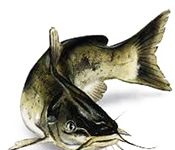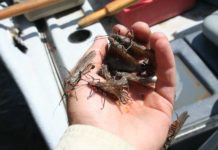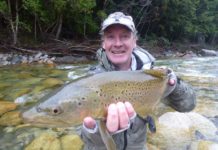I’ve been getting lots of calls, texts, emails, Facebook messages and smoke signals lately, and I’ve noticed there has been a theme amongst the tribe: “Man, it’s been tough.” “Why can’t I catch a fish?” “They just swim around my fly and keep going.” If I were to comment to each of these laments, I would (and I did) say, “When the going gets tough, the tough get going.” “Probably because you can’t fish.” “Change your fly.”
Yes, I know, smart-aleck remarks — but I just can’t help it sometimes. Let’s face it, though, we’ve all had those kind of days when you can’t seem to buy a bite. Now, in this Charlotte Harbor area there is no reason to get completely skunked. There are always a few fish to be caught. These fish may not be your targeted species, but they’re rod-benders just the same. You all know the ones I’m talking about: Trout, ladyfish, jacks etc. But even they can be tough to hook from time to time.
Here in WaterLine, you have read many columns discussing why fish don’t or won’t eat. Some reasons are environmental: Cold fronts, barometric pressure change, water temp changes, tides and moving or nonmoving water, moon phases and other such factors all play a role in why fish will or won’t bite.
But sometimes it’s you. You may be moving your fly or lure too fast. Make sure in winter’s cooler months that you slow your presentation way down. If that doesn’t work, speed it back up. Maybe your fly or lure is too big. Smaller, bite-size food items seem to be on the menu more often during chilly periods. If smaller doesn’t work, go bigger again.
It could be the color. Go natural: Grey and white, tans, olive and whites; they will all work. But fish will also eat root beer metal flake and electric chicken. If natural colors don’t work, try something crazy. There’s no accounting for taste! Depth can make a big difference. If you can’t find them in shallow water flats go to the deeper channels. If that doesn’t work, go shallow again.
I was out fishing with my better half the other day and we were having a great time. It was probably the best weather day we’ve had in two weeks — sunny, no wind (OK, light wind) and clean water. I was catching fish (trout, reds, mackerel) while she was not. Why? I don’t know. We were using the same stuff, fishing out of the same boat, and she usually catches fish.
She also asked me why. I told her what my dad told me when I was a little kid: “You’re just not holding your mouth right!” While when I was a kid, I tried every way to contort my face, bite my lip, or stick my tongue out for the rest of the day while I was trying to catch fish. But she just rolled her eyes, put the rod down and started looking at the birds and seagrass. She’s fine with that.
Then we moved to another spot and I found a school of 45 to 50 redfish. How do I know it was 45 to 50? Because I was able to count them. I backed off and started tossing the fly, and they never bolted off. Nor would they eat. Some would just sit right there and watch the fly go by. Some would just slide over a couple of feet and sit back down.
As I drifted by the school, I changed flies: Different styles, colors, sizes. I fished faster, slower, super slow, way too fast — anything I could think might get one to eat. I even dragged the leader and fly across a fish’s back. It only kicked off a little ways and sat back down. I watched them and counted. They just milled around a little and squatted.
I’d never seen this before. Redfish don’t just sit and hunker down in shallow water like that. The water temp there was almost 65 degrees, the tide was moving, and all was right with the world — but it wasn’t right in the world of those redfish. Diane asked why I was unable to catch even a single fish, and before I gave her a chance to say it, I blurted out, “I’m not holding my mouth right!”
Sometimes fish just don’t want to eat, period. I drifted quite a ways off those reds before getting ready to move the boat. As I bent over to put a rod under the starboard gunwale, a 70-pound tarpon cruised by right on the surface, close enough that I could have poked him with the rod and not bothered by anything.
Of course I made a cast. But that tarpon just swam by the fly with no change in speed and dropped off into deeper water out of sight. What was that tarpon doing there anyway? I should have taken a water sample; those fish must all have been drugged. Did anybody lose a bottle of Xanax on the flats?
Maybe the reason you don’t catch fish is that you are too noisy in the boat, or maybe you should turn your stereo up louder so your choice of music can be heard five miles away instead of only three. Maybe it’s too windy, or maybe it’s not windy enough. Is it too cold? That must be it … or is it not cold enough?
I know what it is, too much boat traffic. Although striper fishing on a particular lake up north, on dead days I used to run through a bait school and the stripers would fire up and start eating. Here, I’ve watched lazy snook come alive when big wakes crashed into a shoreline that I was working. It made the bait move differently. So, maybe not enough boat traffic is the problem.
You should have been here yesterday, you’re wearing the wrong colored shirt, there’s a banana in the boat, you’re standing on the wrong rock, or maybe your biorhythms are just off. Why fish don’t or won’t always eat is an enigma wrapped in a mystery. We have to just put up with it or figure it out — and that’s the fun part, right?
By the way, you can use any of these reasons (or excuses) for not catching fish. They have all been around for a long time — at least as long as mankind has been fishing. Maybe you can come up with some new ones. I finally figured out what the problem with those reds was: Bernie in his mask and mittens was spooking the fish with his magnetic stare.
Just keep fishing. They’ve got to eat sometime. And of course …
Capt. Rex Gudgel is a fly fishing guide in the Boca Grande area and an International Federation of Fly Fishers Master Certified casting instructor. If you’d like to take casting lessons, book a trip or just need more fly fishing info, contact him at 706-254-3504 or visit BocaGrandeSlamFlyFishing.com or CastWithRex.com.
Capt. Rex Gudgel is a fly fishing guide in the Boca Grande area and an International Federation of Fly Fishers Master Certified casting instructor. If you’d like to take casting lessons, book a trip or just need more fly fishing info, contact him at 706-254-3504 or visit BocaGrandeSlamFlyFishing.com or CastWithRex.com.
Credit: Source link































